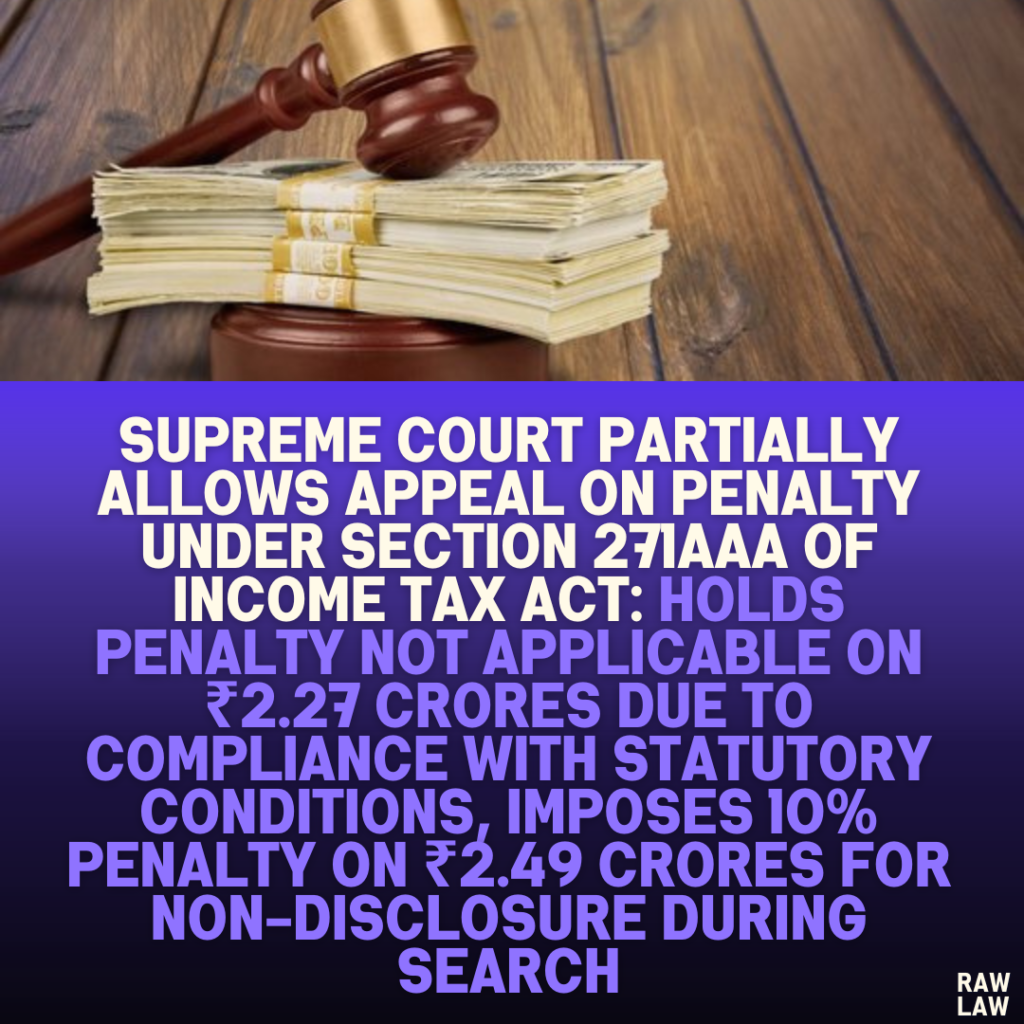Court’s Decision
The Supreme Court, in this judgment, addressed the issue of whether the appellant was liable to pay penalties under Section 271AAA(1) of the Income Tax Act, 1961. It partially allowed the appeal with the following rulings:
- The penalty under Section 271AAA(1) is not applicable on ₹2,27,65,580 as the appellant satisfied all three mandatory conditions under Section 271AAA(2), namely:
- Admission of undisclosed income during the search.
- Substantiation of the manner in which such income was derived.
- Payment of taxes and interest on the undisclosed income, though delayed.
- However, the Court upheld the imposition of a 10% penalty on ₹2,49,90,000 because the appellant failed to disclose this income during the search. This income was only offered during assessment proceedings and not in the search declaration, violating Section 271AAA(2).
Facts of the Case
- Background of the Case:
- The appellant was involved in facilitating the purchase of land under an MOU dated January 19, 2009, and received payments for this purpose.
- A search and seizure operation under Section 132 of the Income Tax Act was conducted on the appellant’s premises on November 25, 2010, revealing undisclosed income.
- Disclosure of Income:
- During the search, the appellant disclosed an income of ₹2,27,65,580 for the relevant assessment year (AY 2011–2012).
- The appellant later filed a return of income for ₹4,77,11,330 for the same assessment year, which was assessed at ₹4,78,02,616.
- Penalty Orders:
- The Assessing Officer (AO) imposed a penalty under Section 271AAA(1) on the entire assessed income (₹4,78,02,616), citing non-compliance with Section 271AAA(2).
Issues Raised
- Is compliance with all three conditions under Section 271AAA(2) mandatory for exemption from penalty under Section 271AAA(1)?
- Can penalties be reduced proportionately for partial compliance or delayed payment of taxes and interest on undisclosed income?
Petitioner’s Arguments
- Penalty is Discretionary:
- Section 271AAA uses the word “may,” suggesting that the imposition of penalty is discretionary and not mandatory.
- The authorities and the High Court wrongly presumed that penalties are automatic unless Section 271AAA(2) is satisfied.
- Undisclosed Income Definition:
- The appellant contended that the ₹2,49,90,000 did not qualify as “undisclosed income” under the definition provided in the Act.
- They argued that the Assessing Officer failed to prove that this income was represented by money or valuable articles found during the search.
- Proportional Penalty:
- The appellant sought a reduced penalty, arguing that they had already paid taxes on the ₹2,27,65,580 disclosed during the search.
- Onus on Revenue Authorities:
- The petitioner cited precedent to argue that the Revenue Authorities must prove that undisclosed income was identified during the search to justify penalties.
Respondent’s Arguments
- Non-Compliance with Section 271AAA(2):
- The appellant failed to fulfill all three conditions for exemption under Section 271AAA(2). Specifically, the income of ₹2,49,90,000 was not disclosed during the search.
- Taxes and interest were paid only years after the assessment order.
- Search Findings:
- The undisclosed income was identified through search proceedings and subsequent investigations. The sale deeds collected from a third party (the Society) were a direct result of the search.
- Judicial Precedent:
- The respondent relied on the Delhi High Court ruling in PCIT v. Amul Gabrani, where the court emphasized strict compliance with Section 271AAA(2) for exemption from penalties.
Analysis of the Law
- Section 271AAA(1):
- The Court clarified that penalties under this provision are discretionary, not mandatory.
- Penalty can be levied at 10% of the undisclosed income if found during a search and not declared by the taxpayer.
- Section 271AAA(2):
- To claim exemption from penalty, the taxpayer must:
- Admit the undisclosed income during the search.
- Substantiate the manner in which the income was derived.
- Pay taxes and interest on the undisclosed income.
- Failure to meet any of these conditions makes the taxpayer liable for penalty.
- To claim exemption from penalty, the taxpayer must:
- Definition of ‘Undisclosed Income’:
- Undisclosed income must relate to assets or transactions not recorded in books or disclosed to the Commissioner before the search.
- The burden of proof lies on the Assessing Officer to demonstrate that the income qualifies as “undisclosed income.”
- Specified Previous Year:
- For penalties, the specified year must relate to the year of search or the year preceding the search where returns were not filed. In this case, AY 2011–2012 was deemed the specified year.
Precedent Analysis
- The Court referred to Aryan Mining & Trading Corporation Ltd., emphasizing that penalty provisions must be strictly construed.
- In PCIT v. Amul Gabrani, the Delhi High Court ruled that conditions under Section 271AAA(2) must be satisfied in entirety to avoid penalties.
Court’s Reasoning
- The appellant satisfied all conditions under Section 271AAA(2) for ₹2,27,65,580, exempting it from penalties.
- The income of ₹2,49,90,000, however, was not disclosed during the search and was identified only through subsequent assessment proceedings. The Court ruled that this income constituted “undisclosed income” and attracted a 10% penalty.
Conclusion
The Supreme Court held that:
- No penalty is attracted on ₹2,27,65,580 as all conditions under Section 271AAA(2) were met.
- A 10% penalty is leviable on ₹2,49,90,000 due to non-compliance with the mandatory conditions under Section 271AAA(2).
- The appellant was directed to pay the penalty on ₹2,49,90,000.
Implications
- This judgment reinforces the principle that exemption from penalties under Section 271AAA requires strict compliance with its conditions.
- It clarifies that income discovered as a result of search investigations, even if not directly found at the premises, qualifies as “undisclosed income.”
- The ruling underscores the importance of timely disclosure of income during search operations to avoid penalties.




Pingback: Delhi High Court: Section 115JB Inapplicable to Electricity Companies Before 2012— "MAT Provisions Cannot Apply Where Machinery Provisions Are Inoperable" - Raw Law